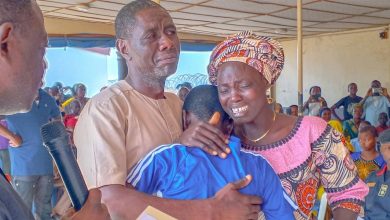The Peril of Buhari’s Excessive Borrowing – By Sydney Elude
Given Nigeria’s past experience with foreign loans, it shouldn’t be taking loans indiscriminately from various creditors, including lenders that benefited from the Paris Club scam. The bulk of the loan Nigeria owed the Paris Club was taken by military regimes, which the so-called advanced democracies had condemned and isolated for not being democratically-elected and for their anti human rights dispositions.
Some of these countries even placed travel ban on some top military officers in government. The country itself was not spared as it was deprived some rights and privileges in the comity of nations in a bid to force a return to democratic governance. They were right, considering the damages military rule did to the country.
The troubling part is that these same countries later insisted that the then democratically-elected government of President Olusegun Obasanjo should pay a debt that had risen several folds more than the principal loan due to abnormal interest rates. It was nothing other than the rich stealing from the poor to get richer. That was what prompted The New York Times to demand the outright cancellation of debts African countries owed the West. “Right now, African countries spend four times as much on paying back their debts than they do on health care. They are trapped into making ever-escalating interest payments that never touch the principal,” says The New York Times.
“… Nigeria borrowed $5 billion, has paid $16 billion and still owes $32 billion.” It then concludes that “canceling these debts should wait no longer.”
A Professor of African American Studies at Eastern Michigan University, Victor Oguejiofor Okafor, also saw the deal as exploitative. In a piece, The Paris Club Deal: Reason to celebrate or reason to cry for Nigeria?, he argues that: “…on balance, Nigeria comes out as the big loser of a lopsided game in which the odds were against Nigeria from the onset. The deal confirms what the literature of the international economic order has long argued: colonialism grafted Africa into an inclement international financial system, which is designed to benefit the haves of the wealthy Northern hemisphere at the expense of the Southern hemisphere.”
Not leading by example
Nigeria should be a light to other African countries by avoiding needless loans that come with high interest rates that make such loans almost unserviceable. However, it has become the encouragement other African countries need to aquire needless loans. Western creditors and economists have done an excellent job in brainwashing us that borrowing is normal provided such loans are used to support our economies. The facts, however, prove otherwise based on the realites of Nigeria and other countries that took foreign loans on one side and the countries that did not, but managed their economies through fiscal discipline and sound policies.
According to a sovereign debt database run by the Bank of Canada and Bank of England, 147 governments have defaulted on their debt obligations since 1960. The majority of these governments are from low-income countries and emerging market economies. In recent times, the IMF says that Argentina, Ecuador, Lebanon and Zambia recently looked to restructure their debts.
In early 2022, the island nation of Sri Lanka defaulted on its foreign debt worth $51 billion amid it worst economic crisis, for the first time since its independence in 1948. Any kind of loan; be it the one emanating from Western countries or China are injurious to any nation that aspires to be prosperous. If loans are good Obasanjo would not have worked tirelessly to free the country from the yoke of the Paris Club.
Buhari’s loan spree
In the last seven and half years, the administration of President Muhammadu Buhari has consistently taken foreign loans to fund infrastructure. And there are projects across the country to justify the loans. The development of infrastructure is important if a country wants to achieve growth. But a government cannot focus only on infrastructure while other critical sectors like health, education, industry, food production and availability struggle. Taking loans for only infrastructure to the extent that the country’s debt profile has risen than it was before Obasanjo’s intervention is a real cause for concern.
According to the Debt Management Office.
Nigeria’s total external debt rose from $10.32bn on June 30, 2015, to $40.06bn as at June 30, 2022. The debts included loans from the World Bank, the African Development bank and the International Monetary Fund. The country also took bilateral loans from China, France, Japan, Germany and India, as well as commercial sources including Eurobonds and Diaspora bonds. DMO also disclosed that domestic debt now stands at N20.95trillion as of June 2022, a rise to N5.24trillion in 30 months.
It is disturbing to some economists that financial institutions like the International Monetary Fund (IMF), could project that “the Nigerian government may spend nearly 100 percent of its revenue on debt servicing by 2026. The IMF’s Resident Representative for Nigeria, Ari Aisen, who made the observation following a macro-fiscal stress test on Nigeria, noted that interest payments on debts might consume the country’s entire earnings in the next four years.
Aisen said: “The biggest critical aspect for Nigeria is that we have done a macro-fiscal stress test, and what you observe is the interest payments as a share of revenue. As you see us in ‘ll of the baseline from the Federal Government of Nigeria, the revenue of almost 100 per cent is projected by 2026 to be taken by debt service.”
“So, the fiscal space or the amount of revenues that will be needed and this, without considering any shock, is that most of the revenues of the Federal Government are now, in fact, 89 per cent and it will continue if nothing is done to be taken by debt service.”
Similarly, the warning by the World Bank about the unsustainability of the country’s debt in the event of macro-fiscal shocks, tallied with the fear of some economists, whose warning the government had ignored. The World Bank said, “Nigeria’s debt remains sustainable, albeit vulnerable and costly, especially due to large and growing financing from the Central Bank of Nigeria.
“While currently the debt stock of 27 per cent of the Gross Domestic Product is considered sustainable, any macro-fiscal shock can push debt to unsustainable levels.
“However, the debt to the GDP in Nigeria is rising quickly, and the total stock of debt in absolute value has almost doubled between 2016 and 2020, and without a policy change is expected to reach 40 per cent of the GDP by 2025.”
No need for more loans
The Buhari administration should work on the troubling areas of the economy like inflation by implementing policies and actions that would strenghtene the naira, weakened the national currency through more loans. Meanwhile, between January and November 2021, the Minister of Finance, Budget and National Planning, Zainab Ahmed said that the Federal Government had spent N4.2tn on debt servicing. She disclosed this during the public presentation of the details of the 2022 Appropriation Bill, signed by the President. Consider also that in the first four months of 2022, the cost of domestic debt servicing stood at N1.2tn, whereas foreign debt service expenditure reached N334.24bn.
This does not enjoy the broad support.as most Nigerians don’t know where this excessive borrowing would lead to as inflation surges, and more Nigerians fall into the poverty line.
The Bank of America (BofA), however, has predicted that the naira will further depreciate in 2023, because it is 20 per cent overvalued. BofA’s economist, Tatonga Rusike, based the prediction on “three indicators – the widely-used black-market rate, the central bank’s real effective exchange rate, and “our own currency fair value analysis.”
“We see scope for it to weaken by an equivalent amount over the next six-nine months, taking it to as high as N520 per USD,” Rusike said. While the naira will come under increasing pressure “due to limited government external borrowing,” devaluation is unlikely to happen until after the February 2023 presidential elections, the bank said.



